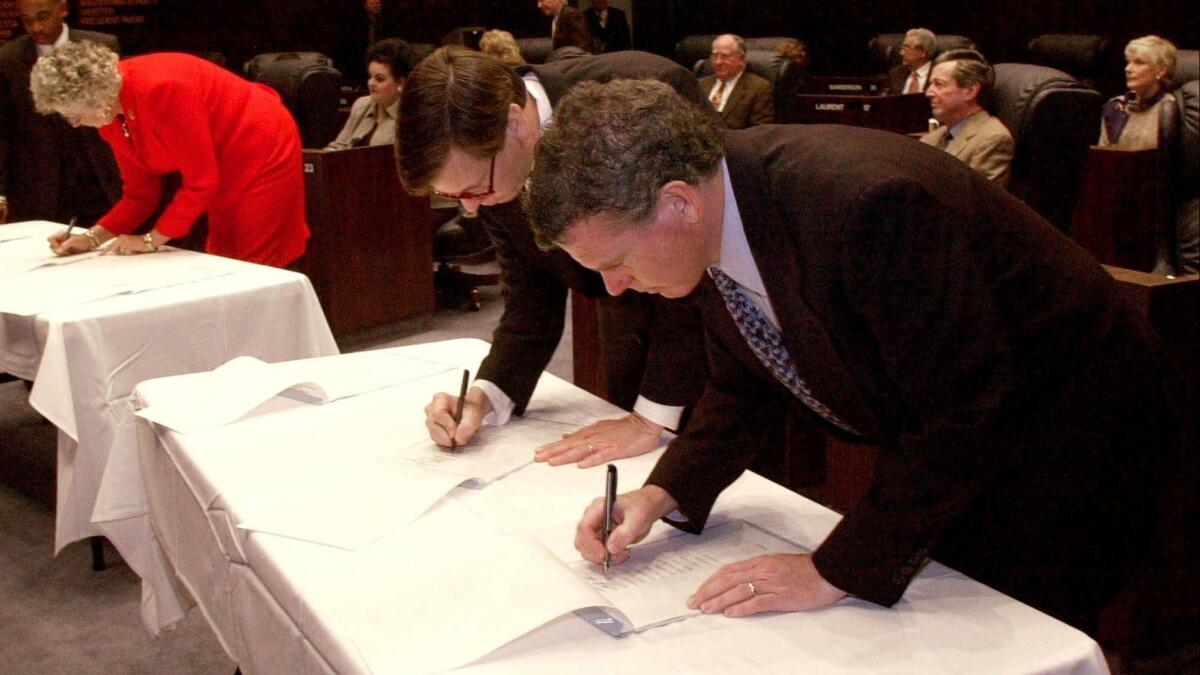Op-Ed: Everyone’s unhappy and it’s all unfair, but let’s not fiddle around with the electoral college

- Share via
Imagine how different the world would look today if Hillary Clinton had won the 2016 election. We may disagree about whether things would be better or worse, but there’s not much question that they would be different. Things like the composition of the Supreme Court, the shape of our healthcare system, the future of the environment, the topic of colloquia at Washington think tanks. And beyond the policy debate, the tenor of our conversations at the office and arguments at the dinner table, relations with our friends and enemies, abroad and at home — in fact, the very definition of who’s a friend and who’s an enemy.
Politics now dominates our chat — and I don’t mean electronic chat. Has anyone said to you, as several people have said to me, variations on “I’m taking tomorrow off from the news. There’s just too much of it and it’s too depressing”? That sentiment wouldn’t be nearly as common if Clinton had won.
It’s the biggest cliché in politics that what the people want, above all else, is change. Never mind what kind of change; the current situation is intolerable. Well, surprise! We wanted change, and now we’ve got it. How do you like it so far? At the moment, the velocity of change is clearer than the direction. The main source of uncertainty is President Trump, who confuses us all by repeatedly doing more or less what he promised during the campaign. Of course many believe that the direction of change is actually pretty clear: straight down and to the right.
Instead of giving the president enormous power, then bemoaning civilization when he or she uses it, why not use legislation to reduce the president’s power?
The smooth and yet dramatic reversal in direction that followed the transfer of presidential power in 2016 is a tribute to American democracy. Especially when you consider that twice in the past five presidential elections — that is, almost half the time — the majority turned over power to the minority (in straight who-got-more-votes terms). How many other nations could pull that off?
But smoothness isn’t everything. The constitutional rules for electing a president are almost comically complex, potentially involving both houses of Congress in different capacities, the entire Cabinet, 50 state legislatures and a two-thirds vote of the people running food trucks along Pennsylvania Avenue. And in the end, we’ve got a government run at almost every level by people whose philosophy of government most citizens voted against. Talk about the silent majority! Every morning we wake up to discover that some corner of government has been taken over by zealots of the right. Trump has been peacefully handed the keys to the car by folks who think he can’t drive and shouldn’t be on the road.
So the election of 2016 — another Republican “victory” on a technicality — still sticks in many a blue craw. They allow themselves to imagine another world (see the first line of this piece.) They think, “OK, we were good sports this time, but let’s at least make sure it never happens again.” This leads to talk of amending the Constitution in various ways. It’s supposed to be difficult to amend the Constitution, but it’s not supposed to be impossible. And the temptation to try is always there, on the right as well as the left.
Enter the Fray: First takes on the news of the minute from L.A. Times Opinion »
You’ll find it hard to believe, children, but back in the 1970s and 1980s, we actually spent vast hours and vaster quantities of intellectual energy debating whether the Constitution should contain a provision making it a crime to burn an American flag. The disputation was intense and arcane. What about a flag used in a military burial? What about a flag reproduced in a car dealership flyer? And so on. Few politicians had the gumption to say to angry flag wavers, “Go away. I’m trying to work on the people’s business.” By some miracle, the flag amendment never passed. But the moment did.
If we went right up to the edge for the sake of our flag, it might seem reasonable enough to do so for the sake of our democratic elections. We wouldn’t be in this mess if we abolished that 18th century artifact, the electoral college. Or if we at least gave the states voting power genuinely apportioned by population. Yes, possibly, all these happy endings are possible. But liberals should resist the temptation to open up the Constitution for competitive bidding.
Howzabout this? Instead of giving the president enormous power, then bemoaning civilization when he or she uses it, why not use legislation to reduce the president’s power in the first place? This can be done without all the complications involved in a constitutional amendment. The best argument against fiddling with the Constitution to get rid of the electoral college is that you’re not the only would-be fiddler in town. Once you open Pandora’s box, you never know what might come out.
Michael Kinsley is a contributing writer to Opinion.
Follow the Opinion section on Twitter @latimesopinion or Facebook
More to Read
A cure for the common opinion
Get thought-provoking perspectives with our weekly newsletter.
You may occasionally receive promotional content from the Los Angeles Times.






